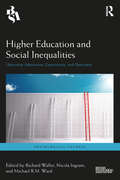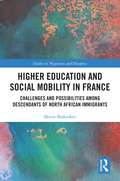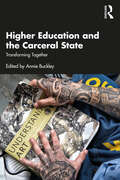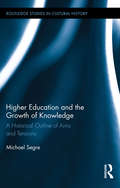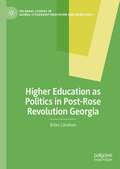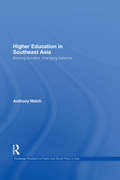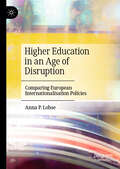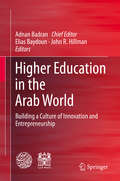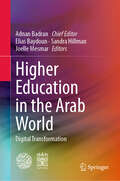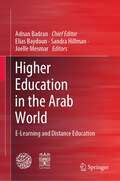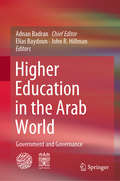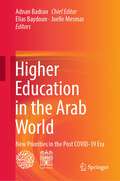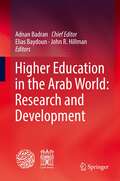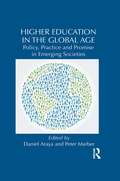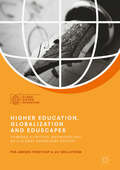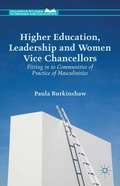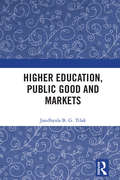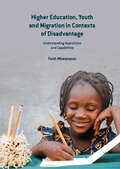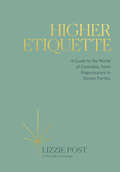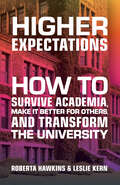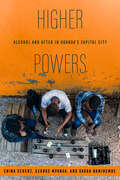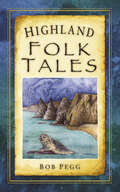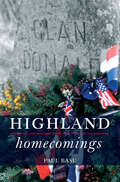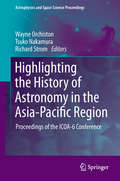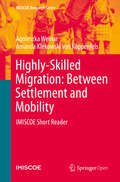- Table View
- List View
Higher Education and Social Inequalities: University Admissions, Experiences, and Outcomes (Sociological Futures)
by Nicola Ingram Richard Waller Michael R.M. WardA university education has long been seen as the gateway to upward social mobility for individuals from lower socio-economic backgrounds, and as a way of reproducing social advantage for the better off. With the number of young people from the very highest socio-economic groups entering university in the UK having effectively been at saturation point for several decades, the expansion witnessed in participation rates over the last few decades has largely been achieved by a modest broadening of the base of the undergraduate population in terms of both social class and ethnic diversity. However, a growing body of evidence exists in the continuation of unequal graduate outcomes. This can be seen in terms of employment trajectories in the UK. The issue of just who enjoys access to which university, and the experiences and outcomes of graduates from different institutions remain central to questions of social justice, notably higher education’s contribution to social mobility and to the reproduction of social inequality. This collection of contemporary original writings explores these issues in a range of specific contexts, and through employing a range of theoretical and methodological approaches. The relationship between higher education and social mobility has probably never been under closer scrutiny. This volume will appeal to academics, policy makers, and commentators alike. Higher Education and Social Inequalities is an important contribution to the public and academic debate.
Higher Education and Social Mobility in France: Challenges and Possibilities among Descendants of North African Immigrants (Studies in Migration and Diaspora)
by Shirin ShahrokniThis book offers an in-depth sociological exploration of the social trajectories and experiences of children of post-colonial immigrants in France who are embarking on paths of extreme upward intergenerational mobility. The author draws on life history interviews with young adults of North African immigrant background, enrolled at or having recently graduated from the country’s elite higher education institutions, the grandes écoles, to delve into largely under-researched pathways and give a voice to high-achieving members of a population that continues to be collectively associated with difficulties to ‘integrate’. The volume constitutes the first sociological study to document, from the individual actor’s perspective, the everyday experience of racism within France’s elite educational institutions and to reveal the upward mobility experience to be informed by the interlocking effects of racial processes, immigrant ancestry, class background, and gender. Challenging the pervasive representation of descendants of North African immigrants as ‘unsuccessful’ and ‘unable to integrate’, this book sheds light on the experiences of the largely silent upwardly mobile members of a stigmatized minority group, revealing the strategies used to respond to the constraints to their mobility and the importance of familial histories of post-colonial migration, characterized by the former generation’s efforts, sacrifices, and resilience, in informing these ‘success stories’.
Higher Education and the Carceral State: Transforming Together
by Annie BuckleyHigher Education and the Carceral State: Transforming Together explores the diversity of ways in which university faculty and students are intervening in the system of mass incarceration through the development of transformative arts and educational programs for students in correctional institutions.Demonstrating the ways that higher education can intervene in and disrupt the deeply traumatic experience of incarceration and shift the embedded social-emotional cycles that lead to recidivism, this book is both inspiration and guide for those seeking to create and sustain programs as well as to educate students about the types of programs universities bring to prisons.From arts workshops and educational courses to degree-granting programs, individuals and communities across multiple disciplines in higher education are actively breaking the cycle of shame and division in mass incarceration through direct engagement. This book explores the inspiring, innovative, and changemaking initiatives in carceral spaces - from arts workshops and educational courses to degree granting programs - through the lens of faculty, artists, scholars, students, and administrators. Readers will learn the diverse ways in which these interventions and partnerships can take shape and the life changing impacts that they have on all those involved, in particular students who are incarcerated. The book includes authors with lived experience of incarceration throughout.Section I highlights the voices of students who are currently or formerly incarcerated, while Section II addresses diverse collaborations through and across systems of corrections and education. Section III features the voices of teaching artists, while Section IV includes those that start and lead these programs, offering roadmaps for others interested in engaging in this transformative work.
Higher Education and the Growth of Knowledge: A Historical Outline of Aims and Tensions (Routledge Studies in Cultural History)
by Michael SegreThis book sketches the history of higher education, in parallel with the development of science. Its goal is to draw attention to the historical tensions between the aims of higher education and those of science, in the hope of contributing to improving the contemporary university. A helpful tool in analyzing these intellectual and social tensions is Karl Popper's philosophy of science demarcating science and its social context. Popper defines a society that encourages criticism as "open," and argues convincingly that an open society is the most appropriate one for the growth of science. A "closed society," on the other hand, is a tribal and dogmatic society. Despite being the universal home of science today, the university, as an institution that is thousands of years old, carries traces of different past cultural, social, and educational traditions. The book argues that, by and large, the university was, and still is, a closed society and does not serve the best interests of the development of science and of students' education.
Higher Education as Politics in Post-Rose Revolution Georgia (Palgrave Studies in Global Citizenship Education and Democracy)
by Brian LanahanThis book summarises the evolution of the higher education system in post-Soviet Georgia, amidst democratisation, economic liberalisation and European integration. The author gives an overview of the recent political history in Georgia, paying particular attention to both the collapse of the Soviet Union as well as the Rose Revolution, and their roles in transforming the education system. The book seeks out national and international perspectives to understand how higher education in Georgia can be further developed to meet the needs of all Georgians, while also further advancing Euro-Atlantic integration. It will be of interest to students and scholars of comparative education, as well as the related fields of international development, political science and history.
Higher Education in Southeast Asia: Blurring Borders, Changing Balance (Routledge Research On Public and Social Policy in Asia)
by Anthony WelchThis is the first book to systematically chart and comparatively assess the trend towards private higher education in South East Asia. Caught between conflicting imperatives of spiralling demand, and limited resources, the balance between public and private higher education systems in South East, South, and East Asia has shifted markedly. The author’s detailed case studies of Indonesia, Malaysia, Thailand, the Philippines, and Viet Nam discuss and analyse significant policy issues and touch on key debates surrounding globalisation, including economic globalisation and structural adjustment, and the pressures of cultural globalisation, particularly the role of the English language. Debates surrounding the role of higher education in the ‘knowledge economy’, GATS and cross border trade in educational services are also treated, including the rise of offshore campuses in countries such as Malaysia and Viet Nam. What is argued is that we are witnessing not merely a changing balance between public and private sectors, but a blurring of borders between them, with public HEIs now often behaving more like private, for-profit institutions. The book charts and illustrates these trends, posing questions about their meaning, including issues of transparency, equity, and what the reforms might mean for traditional conceptions of public good in higher education.
Higher Education in an Age of Disruption: Comparing European Internationalisation Policies
by Anna P. LohseThis book investigates European higher education internationalisation policies during a period marked by extreme upheaval due to Brexit and the COVID-19 pandemic. Situating her analysis at the intersection of higher education research and policy studies, the author combines historical and sociological institutionalism to investigate how this time of disruption impacted higher education policies in England, France and Germany. Based on extensive qualitative data derived from expert interviews and document analysis, the study offers timely insights into dynamics of institutional change and stability in higher education governance, as well as implications for the future of cross-border education and internationalisation. The book will appeal to academics and students interested in education policy and the internationalisation of higher education.
Higher Education in the Arab World: Building a Culture of Innovation and Entrepreneurship
by Elias Baydoun John R. Hillman Adnan BadranThis book is the first major account of innovation and entrepreneurship in the Arab higher-education sector. It provides an update of the current situation and advances reasons for the under-performance of Arab universities in international ranking tables and the weaknesses of Arab economies. Specific proposals are made for upgrading curricula and assessment procedures as well as providing an environment that fosters innovation and entrepreneurial behaviour. The roles of university-based technology and business parks are examined, with examples of successful business partnerships in the Arab region, Europe, and North America.Opportunities for innovation and entrepreneurship have never been greater with the wealth of rapidly developing transformative technologies that are driving the international knowledge economy. This book puts forward proposals for the management and exploitation of intellectual property, and for establishing businesses.
Higher Education in the Arab World: Digital Transformation
by Elias Baydoun Adnan Badran Joelle Mesmar Sandra HillmanThis book provides a comprehensive insight and roadmap to accelerate the implementation of digital transformation (DX) within Arab Universities along with an understanding of the challenges that accompany such change. It explores the elements of DX in universities and presents case studies and experiences from Arab Universities along with recommendations that facilitate the use of DX in higher education. Within the Arab region, the potential for digitization within the higher education landscape has significant outcomes and impacts on the growth, progression, and development of this sector. Digital transformation allows universities to respond to change while fostering a student-centered approach and remaining relevant to the growing demands of the twenty-first century. It also improves the universities activities such as teaching and learning, curricula development and implementation, processes, operations, support services, and infrastructure. This increases the university’s competitive advantage locally and internationally. Embracing and adopting DX requires a paradigm shift in a university’s strategy and culture. The Arab world is home to more than 1,000 universities and in excess of 13 million students, and its higher education system offers a diverse range of undergraduate and postgraduate programs. To continue our series of books on higher education, we propose that the theme of this 8th book should be “Higher Education in the Arab World: Digital Transformation” in universities. In a complex regional and global climate, this book provokes a rich exploration of ideas around the challenges surrounding this sector and how to address them.
Higher Education in the Arab World: E-Learning and Distance Education
by Elias Baydoun Adnan Badran Joelle Mesmar Sandra HillmanThis book provides a comprehensive insight into the benefits and advantages of adopting technology-driven learning as a central pillar of the universities’ teaching, learning, research, and social-responsibility strategies. Despite the importance of adopting technology-enhanced learning within higher education institutions, Arab countries are still slow to change. Arab Universities are facing the need to adopt new methods of learning to serve the demands of a changing demography in the higher education community as well as the requirements of Industry 4.0 and Society 4.0. E-Learning and distance education are not just about technology, but they are about education, pedagogy, curriculum design, research, and innovation. The book also discusses the best methods to implement these modes of learning while taking into consideration all the hurdles and challenges specific to the Arab world. The needs of students (undergraduate and postgraduate), faculty, and the university at large are considered while drawing on the best quality-assurance practices to ensure the quality of education remains uncompromised. Also featured in this book are experiences from Arab Universities and recommendations for improvements that facilitate the use of education technology tools as part the university’s pedagogy to harness the full potential for implementing e-learning and distance education.
Higher Education in the Arab World: Government and Governance
by Elias Baydoun John R. Hillman Adnan BadranThis book examines the unsatisfactory situation in the Arab world where there is a pressing need to address poverty, unemployment, political instability, corruption, and the existential threat of climate change. The authors analyze the relationships between universities and governments in the Arab world, and make recommendations that will help develop intellectual capacity and thereby aid the economic and social transitions so desperately needed in all Arab countries. Countries aspiring to participate fully in the global knowledge economy require dynamic university sectors operating in concert with governments that actively promote high-quality education and research and foster innovation and entrepreneurship. Successful university-government relationships can be complex and are continually evolving.
Higher Education in the Arab World: New Priorities in the Post COVID-19 Era
by Elias Baydoun Adnan Badran Joelle MesmarThis book presents selected case studies from the Arab world on the universities responses to the pandemic. This book will look in detail at the priorities of the higher education sector in the post-COVID-19 era and the changes that must be adopted by universities and governments. These changes will allow the higher education sector to emerge from the crisis and build short- and long-term resilience.The onset of the COVID-19 pandemic has induced sudden changes worldwide by setting a global lockdown that has impacted all industries and sectors, affecting our daily lives and forcing us to adapt to a new normal. This book is the first major account of how the pandemic has shaken universities and higher education institutions in the Arab world today and tomorrow. Crucially, it examines the responses of universities to COVID-19, highlights their current position, and addresses the negative and positive outcomes. Has this crisis become an adversity or an opportunity for higher education institutions? What are the pillars that will ensure the success of the Arab higher education sector post COVID-19?
Higher Education in the Arab World: Research and Development
by Elias Baydoun John R. Hillman Adnan BadranCountries aspiring to participate fully in the global knowledge economy require high-quality education and research that leads to innovation, entrepreneurship and development. In spite of the large number of institutions higher education institutions, the Arab World failed to capitalise in research and development. This book will examine the current position of university research and development in the Arab region, note the main themes, their international impact, and propose new directions. Crucially, it will examine the underlying reasons for the underperformance, including specific government research policies, university-appointment and governance processes to stimulate research, funding assessment and allocation processes, resource limitations, and public attitudes. By substantially upgrading the research component of Arab universities along with the quality of education generally, the Arab world will have the vehicle to transition into peaceful, stable, and members of leading global economies. There are opportunities for inter-university cooperation and the establishment of regional university-linked research institutes with specialist facilities.
Higher Education in the Global Age: Policy, Practice and Promise in Emerging Societies (Routledge Studies in Emerging Societies #4)
by Peter Marber Daniel ArayaDiscussions on globalization now routinely focus on the economic impact of developing countries in Asia, Africa, the Middle East, the former Soviet Union and Latin America. Only twenty-five years ago, many developing countries were largely closed societies. Today, the growing power of “emerging markets” is reordering the geopolitical landscape. On a purchasing power parity basis, emerging economies now constitute half of the world’s economic activity. Financial markets too are seeing growing integration: Asia now accounts for 1/3 of world stock markets, more than double that of just 15 years ago. Given current trajectories, most economists predict that China and India alone will account for half of global output by 2050 (almost a complete return to their positions prior to the Industrial Revolution). How is higher education shaping and being shaped by these massive tectonic shifts? As education rises as a geopolitical priority, it has converged with discussions on economic policy and a global labor market. As part of the Routledge Studies in Emerging Societies series, this edited collection focuses on the globalization of higher education, particularly the increasing symbiosis between advanced and developing countries. Bringing together senior scholars, journalists, and practitioners from around the world, this collection explores the relatively new and changing higher education landscape.
Higher Education, Globalization and Eduscapes: Towards A Critical Anthropology Of A Global Knowledge Society (Palgrave Studies in Global Higher Education)
by Per-Anders Forstorp Ulf MellströmThis book examines transnational scapes and flows of higher education: arguing that the educational and political vision of a national, regional and global knowledge society needs to be perspectivized beyond its ethnocentric conditions and meanings. Using eduscapes as its most important concept, this book explores the educational landscapes of individual as well as institutional actors; particularly the agential aspects of how global eduscapes are imagined, experienced, negotiated and constructed. In addition, the authors highlight the critical potential of anthropology, using this perspective as a resource for cultural critique where the Western experience and assumed ‘ownership’ of the global knowledge economy will be put into question. This comprehensive book will appeal to students and scholars of educational policy, the sociology of education and the globalization of education.
Higher Education, Leadership and Women Vice Chancellors
by Paula BurkinshawWhy are there so few women vice chancellors in UK higher education? In this book, Paula Burkinshaw explores the contemporary conversation around the 'missing women at the top' across UK society through in-depth interviews with the (hitherto) silent voices of women vice chancellors. These women have successfully negotiated with and navigated the gendered leadership cultures of higher education throughout their careers and speak of the masculine communities of their workplaces. Advocating the need to achieve a critical mass of women at the top, this book suggests there is still much to be done in the higher education sphere.
Higher Education, Public Good and Markets
by Jandhyala B. TilakThis book critically examines some of the major trends in the development of higher education. It demonstrates how in the context of liberalisation, globalisation and marketisation, the crisis in higher education has assumed different dimensions in all advanced and emerging societies. The author shows how the state tends to slowly withdraw from the responsibility of higher education, including in the arena of policy-making, or simply adopts a policy of laissez-faire (of non-involvement) which helps in the rapid unbridled growth of private sector in higher education. The notion of higher education as a public good is under serious contestation in current times. The book argues for the need to resurrect the compelling nature of higher education along with its several implications for public policy and planning, while providing a broad portrayal of global developments, comparative perspectives and key lessons. The volume will be of interest to scholars and researchers of education, political science, public policy and administration, governance, development studies, economics, and those working in the higher education sectors, think-tanks, policymakers as well as NGOs.
Higher Education, Youth and Migration in Contexts of Disadvantage: Understanding Aspirations and Capabilities
by Faith MkwananziThis book explores the lives, experiences and the formation of higher educational aspirations among marginalised migrant youth in South Africa. Using a case study based in Johannesburg, the author illuminates their voices in order to demonstrate the reality faced by these young people in the context of migration to the Global South. Within the complex landscape of global and African migration, this book draws on detailed narratives to understand the conditions under which aspirations for higher education are – or are not – developed. In doing so, the author highlights the value of understanding individual lives, experiences and opportunities from a human development point of view, capturing the multidimensional disadvantages experienced by migrants in a balanced, intersectional manner. Balancing empirical data with theoretical analysis, this volume tells a rich, nuanced story about marginalised migrant youth – an essential work for understanding the conditions necessary for such youth to live valuable lives in both local and international contexts. This book will appeal to students and scholars of youth migration, aspiration and educational opportunities, particularly within the Global South.
Higher Etiquette: A Guide to the World of Cannabis, from Dispensaries to Dinner Parties
by Lizzie PostEmily Post has gone to pot.As we enter the dawn of a new "post-prohibition" era, the stigma surrounding cannabis use is fading, and the conversation about what it means to get high is changing. When it comes to being a respectful, thoughtful, and responsible consumer of pot, there is a lot you need to know. In Higher Etiquette, Lizzie Post--great-great granddaughter of Emily Post and co-president of America's most respected etiquette brand--explores and celebrates the wide world of legalized weed. Combining cannabis culture's long-established norms with the Emily Post Institute's tried-and-true principles, this book covers the social issues surrounding pot today, such as: * How to bring it to a dinner party or give it as a gift * Why eating it is different from inhaling it * How to respectfully use it as a guest * Why different strains affect you in different ways * How to be behave at a dispensary * How to tackle pot faux pas such as "canoed" joints and "lawn-mowed" bowlsThis handy guide also provides a primer on the diverse array of cannabis products and methods of use, illuminating the many convenient and accessible options available to everyone from experienced users to newbies and the canna-curious. Informative, charming, and stylishly illustrated, this buzzworthy book will make the ultimate lit addition to your stash.
Higher Expectations: How to Survive Academia, Make it Better for Others, and Transform the University
by Leslie Kern Roberta HawkinsHigher Expectations is a practical guide to navigating academia for people who want to improve their own day-to-day work lives and create better conditions for everyone. Universities are broken: they’re built on systems that are discriminatory, hierarchical, and individualistic. This hurts the people that work and learn in them and limits the potential for universities to contribute to a better world. But we can raise our expectations. Hawkins and Kern envision a university transformed by collaboration, care, equity, justice, and multiple knowledges. Drawing on real-world, international examples where people and institutions are already doing things in new ways, Higher Expectations offers concrete advice on how to make these transformations real. It covers many areas of academic life including course design, conferencing, administration, research teams, managing workloads and more. Designed for faculty, graduate students, postdoctoral researchers, and other scholars, Higher Expectations delivers hope and practical actions you can take to start making change now. It is a must-have for everyone working in academia today.
Higher Powers: Alcohol and After in Uganda’s Capital City
by China Scherz George Mpanga Sarah NamirembeHigher Powers draws on four years of collaborative fieldwork carried out with Ugandans working to reconstruct their lives after attempting to leave behind problematic alcohol use. Given the relatively recent introduction of biomedical ideas of alcoholism and addiction in Uganda, most of these people have used other therapeutic resources, including herbal aversion therapies, engagements with balubaale spirits, and forms of deliverance and spiritual warfare practiced in Pentecostal churches. While these methods are at times severe, they contain within them understandings of the self and practices of sociality that point away from models of addiction as a chronic relapsing brain disease and towards the possibility of release. Higher Powers offers a reconceptualization of addiction and recovery that may prove relevant well beyond Uganda.
Highland Folk Tales (Folk Tales: United Kingdom)
by Bob PeggThe Highlands of Scotland are rich in traditional stories. Even today, in the modern world of internet and supermarkets, old legends dating as far back as the times of the Gaels, Picts and Vikings are still told at night around the fireside. They are tales of the sidh – the fairy people – and their homes in the green hills; of great and gory battles, and of encounters with the last wolves in Britain; of solitary ghosts, and of supernatural creatures like the sinister waterhorse, the mermaid, and the Fuath , Scotland’s own Bigfoot. In a vivid journey through the Highland landscape, from the towns and villages to the remotest places, by mountains, cliffs, peatland and glen, storyteller and folklorist Bob Pegg takes the reader along old and new roads to places where legend and landscape are inseparably linked.
Highland Homecomings: Genealogy and Heritage Tourism in the Scottish Diaspora
by Paul BasuThe first full-length ethnographic study of its kind, Highland Homecomings examines the role of place, ancestry and territorial attachment in the context of a modern age characterized by mobility and rootlessness. With an interdisciplinary approach, speaking to current themes in anthropology, archaeology, history, historical geography, cultural studies, migration studies, tourism studies, Scottish studies, Paul Basu explores the journeys made to the Scottish Highlands and Islands to undertake genealogical research and seek out ancestral sites. Using an innovative methodological approach, Basu tracks journeys between imagined homelands and physical landscapes and argues that through these genealogical journeys, individuals are able to construct meaningful self-narratives from the ambiguities of their diasporic migrant histories, and recover their sense of home and self-identity. This is a significant contribution to popular and academic Scottish studies literature, particularly appealing to popular and academic audiences in USA, Canada, Australia, New Zealand and Scotland
Highlighting the History of Astronomy in the Asia-Pacific Region
by Richard G. Strom Wayne Orchiston Tsuko NakamuraWith just 400 pages, this title provides readers with the results of recent research from some of the world's leading historians of astronomy on aspects of Arabic, Australian, Chinese, Japanese, and North and South American astronomy and astrophysics. Of particular note are the sections on Arabic astronomy, Asian applied astronomy and the history of Australian radio astronomy, and the chapter on Peruvian astronomy. This title is of particular appeal to those with research interests in applied historical astronomy; archaeoastronomy; calendars, manuscripts, and star charts; historical instruments and observatories, and the history of radio astronomy.
Highly-Skilled Migration: IMISCOE Short Reader (IMISCOE Research Series)
by Agnieszka Weinar Amanda Klekowski von KoppenfelsThis open access short reader discusses the emerging patterns of sedentary migration versus mobility of the highly-skilled thereby providing a comprehensive overview of the recent literature on highly-skilled migration. Highly-skilled migrations are arguably the only non-controversial migrant category in political and public discourse. The common perception is that highly-skilled migrants are high-earners with top educational skills and that they are easy to integrate. These perceptions make them a “wanted” migrant. There seems to be however a big divide between the popular perceptions of this migration and its realities uncovered in social research. This publication closes this divide by delving deeper in the variety of experiences, discourses and realities of highly skilled migrants, thereby uncovering the inherent divides between the highly skilled migrants from the North and the South. The reader shows that these divides are constructed realities, shaped by the state policies and underpinned by social imaginary. Written in an accessible language this reader is a perfect read for academics, students and policy makers and all those unfamiliar with the topic.
